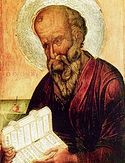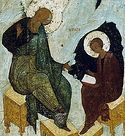

| Previous day | Next day |
| Old Style
May 8
|
Sunday |
New Style
May 21
|
| 6th Sunday of Pascha. Sunday of the Blind Man. Tone 5. | No fast.
|
![]() Apostle and Evangelist John the Theologian (98-117).
Apostle and Evangelist John the Theologian (98-117). ![]() St. Arsenius the Great, of Scetis (449-450).
St. Arsenius the Great, of Scetis (449-450).
St. Pimen the Faster, of the Far Caves in Kiev (12th c.). St. Arsenius the Lover of Labor, of the Kiev Caves (14th c.) Sts. Zosima and Adrian, of Volokolamsk, founders of the Sestrinsk Monastery (15th c.-16th c). Translation of the relics of St. Arsenius of Novgorod, fool-for-Christ (1785).
St. Hierax of Egypt (5th c.). St. Iduberga, foundress of Nivelles (Neth.) (652). Sts. Wiro (710) and Plechelm (730), missionary bishops, and Otger, deacon (8th c.), in the Maas Valley at Limburg (Neth.). St. Macarius of Ghent, archbishop (1012). St. Emilia (375), mother of Sts. Macrina, Basil the Great, Naucratius, Peter of Sebaste, and Gregory of Nyssa.
Commemoration of the healing of the blinded Stephen by the Icon of the Most Holy Theotokos of Cassiopia.) Repose of Hieroschemamonk Michael of Valaam, confessor for the Orthodox Calendar (1934).
Thoughts for Each Day of the Year
According to the Daily Church Readings from the Word of God
By St. Theophan the Recluse

Sunday of the Blind Man. [Acts 16:16–34; John 9:1–38]
Simplicity of faith argues with crafty unbelief. Faith, coming to the blind man who received sight, enlightened his mind’s eyes, and he clearly saw the truth. See how everything was logical for him. They ask him: what do you say of Him who gave you sight? He is a prophet, he answered, that is the messenger of God, clothed in miracle-working power. An indisputably true conclusion! But learned erudition does not want to see this trueness and seeks to evade its consequences. However, this being impossible, it approaches unlearned simplicity with the suggestion: give God the praise: we know that this man is a sinner. Simplicity of faith does not know how to connect these concepts—sinfulness and miracle-working, and expresses this openly: Whether he be a sinner or no, I know not: one thing I know, that, whereas I was blind, now I see. What can one say against such deduction? But the logic of the unbelievers is obstinate, and even in the face of obviousness it is not ashamed to affirm that it does not know where he who opened the blind man’s eyes is from. Why herein is a marvellous thing, the sensible logic of faith says to them, that ye know not from whence He is, and yet He hath opened mine eyes. Now we know that God heareth not sinners: but if any man be a worshipper of God, and doeth His will, him he heareth. Since the world began was it not heard that any man opened the eyes of one that was born blind. If this man were not of God, He could do nothing (John 9:17–33). It would seem as though after this nothing remained other than to bow down before the power of such a conclusion. But learned erudition could not stand the sensible logic of faith, and drove it away... Go now, prove the truth of the faith to those whose mind has been corrupted with obstinate unbelief. The unbelievers of all times are cut from the same cloth.
Articles
 Venerable Arsenius the GreatSaint Arsenius the Great was born in the year 354 at Rome into a pious Christian family, which provided him a fine education and upbringing. |
 Venerable Arsenius the Lover-of-Labor of the Kiev Far CavesSaint Arsenius the Lover of Labor lived during the fourteenth century. |






